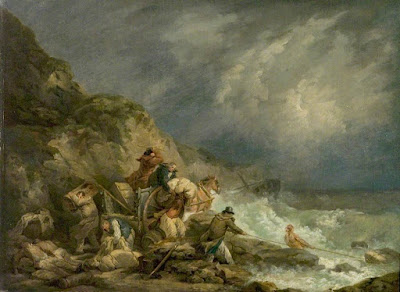Dirty Money in the UK (Part 3), The Rich and the Poor
 |
| The Wreckers George Morland (1763-1804) Photo Credit: Nottingham City Museums & Galleries [CC BY-NC] |
The super-rich are not worrying about their heating bills. Or taxes. Or indeed anything much. Like France's pre-revolutionary aristocracy, their gilded lifestyle is untouched by the mundane concerns that so burden us economic serfs.
Their courtiers - our wiliest bankers, lawyers and accountants, along with a slew of grifters and fixers - are lucratively employed keeping things that way. It is these enablers who create the tax-proof offshore structures, the anonymous shell companies and the opaque trusts that shelter the fortunes and identities of the extremely wealthy. They fend off any attempts by our fragmented, underfunded law enforcement agencies and regulators to penetrate these defences. They bully critics into silence with libel writs or contrived lawsuits based on data-privacy breaches. The result is that, according to the National Crime Agency, £100 billion in dirty money is channelled through Britain every year.
For decades this was an irritant not a priority. The war in Ukraine prompted a belated rethink of our openness to Russian oligarchs...
The heart of illicit finance is anonymity: without identifying "beneficial owners" (the people behind a company or trust) you cannot ask awkward questions, such as where the money comes from...
Financial assets can be shuffled around the world. But land and buildings are immovable. I would target Britain's 90,000 - plus properties owned by shell companies, insisting that they identify their beneficial owner when they pay council tax or business rates, or transfer ownership. Failure to do this would lead to the property being seized and auctioned, with the proceeds (certainly millions, most likely billions) going to fill our depleted public coffers.
The money will help ease the crushing load now landing on the rest of us. Rooting out illicit finance also helps shore up confidence in our system's fairness and integrity. We do not yet live in a country run by the dodgy rich for the dodgy rich. But it feels alarmingly close to it sometimes.
(Edward Lucas, The Times, 2022)
The rich, let alone the super-rich, do not worry about their heating bills and we, in this country, have known for decades how the oligarchs preserve their ill-gotten gains. The establishment have welcomed them with open arms, people shrugged when their "gifts" to the Tory party were discovered. We shrugged again when Mandelson and Deripaska or Johnson and Lebedev were revealed as "good friends".
"We do not yet live in a country run by the dodgy rich for the dodgy rich." I fear, Mr Lucas, you may well be wrong. Evidence? Just look at the latest tax cuts for the very rich.
 |
| Despair Eric Harald Macbeth Robertson (1887-1941) Photo Credit: Glasgow Life Museums [CC BY-NC-ND] |
... They [the rich] may have to turn down the Aga but heating prices won't hit them as hard as the worst off. They've even been given help to heat their second homes. As struggling state schools are forced to increase class size, the wealthy can rely on tutors and private schools. They can skip the vast NHS queue for their private hip replacement and pay to have their infected wisdom teeth extracted. If they want to avoid the sewage along the English coastline they can fly to the Maldives, and while the majority have cut back on their weekly shop and stuck to budget ranges there has been no dip in orders for new yachts and luxury watches...
But the poorest 5 per cent of British households are ranked 15th in Europe and have a standard of living 20 per cent weaker than their counterparts in Slovenia. If the trend continues, the average British household will be worse off than the average Slovenian household by 2024 and the average Polish family by the end of the decade...
Liz Truss appears supremely relaxed about the filthy rich. George Osborne was always careful as chancellor to say "we're all in this together" when he announced savage cuts. Theresa May talked about "burning injustices" in her first address outside Downing Street. Even Boris Johnson set up a levelling up department to appease the red-wall constituencies in the North who voted for him. But Truss is in danger of looking as though she revels in boosting the wealthy. Trickle-down economics, she says, is the best way to help the less well-off but it doesn't look like she's on the side of the disadvantaged, who are more likely to see it as sink or swim capitalism...
"Nobody cedes their privilege," says the rich white banker in The White Lotus. "It goes against human nature. We're all just trying to win the game of life." But if the rich in Britain aren't careful, a new government will take their money instead.
(Alice Thomson, The Times, 2022)
 |
| Zusammenbruch (Collapse) Ludwig van Hofmann (1861-1945) Photo Credit: Leicester Museums and Galleries [CC BY-NC SA] |
Comments
Post a Comment